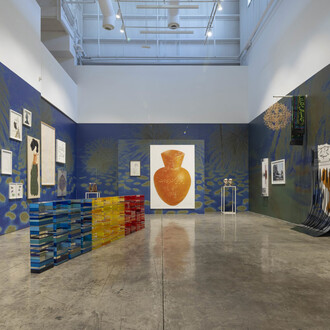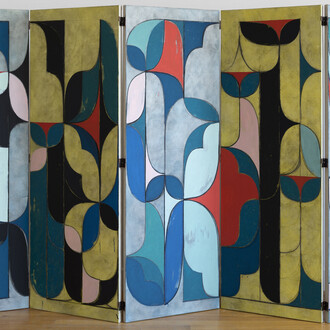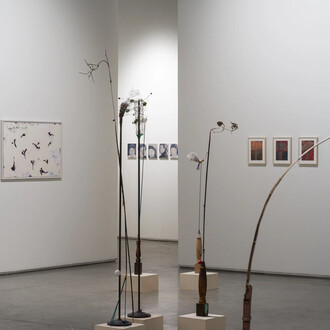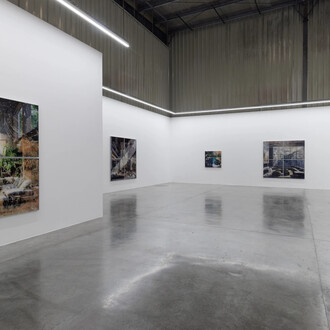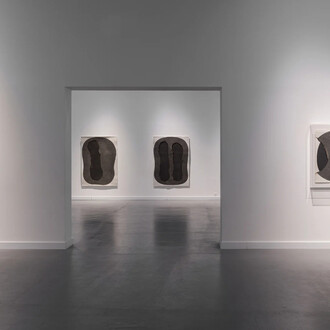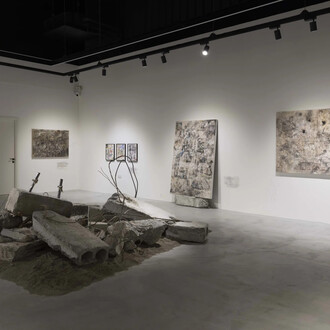Leila Heller Gallery is delighted to announce the upcoming exhibition curated by Behrang Samadzadegan, titled ...I kept the night vigil... - exploring women’s voices across and beyond the Middle East, opening on 18th September 2024.
I kept the night vigil stands as a beacon of artistic resilience and innovation, celebrating the profound contributions of female artists from the Middle East and those working there. Inspired by the evocative poetry of al-Khansa*, who eloquently conveyed the nuances of grief, strength, and transformation, the exhibition resonates with the timeless spirit of women’s voices in a region marked by rich cultural heritage and contemporary challenges.
Historically, women in the Middle East have been pivotal in cultivating and transmitting knowledge, art, and culture. Prevailing stereotypes often overshadow these historical narratives, yet they form the backbone of an enduring tradition of female intellectualism and creativity. Philosophically, the exhibition draws from the concept of "night vigil" as a metaphor for both introspection and vigilance. It embodies the dual role women have often played: as preservers of culture and as agents of change. The night vigil signifies a period of quiet resistance, reflection, and the formulation of new ideas under cover of darkness—times when the world is still, and the mind can wander freely.
The title, I kept the night vigil, is derived from the works of al-Khansa, a poet celebrated for her profound expressions of sorrow and resilience. Al-Khansa’s poetry, deeply rooted in personal and collective experience, transcends time, offering a poignant lens through which the voices of contemporary female artists can be understood.
The featured artists bring forth a tapestry of unique and enlightening perspectives, utilizing various mediums to explore themes such as women's issues, war, memory, and the natural world. Each piece is a testament to women's individual and collective experiences in the Middle East, merging personal narratives with broader socio-political commentary.
I kept the night vigil is a tribute to the enduring spirit and innovative prowess of women artists from the Middle East. It is a celebration of their resilience, a testament to their creativity, and a recognition of their crucial role in shaping the cultural and intellectual landscape. By drawing from historical, philosophical, and sociological insights, this exhibition offers a rich, multi-faceted exploration of contemporary Middle Eastern art through the eyes of its women creators. It is an invitation to reflect, engage, and honor the night vigils kept by these remarkable artists, whose works illuminate the path towards a more inclusive and nuanced understanding of the world.
Al-Khansa was a 7th-century tribe of women living in the Arabian Peninsula. She was one of the most influential poets of the pre-Islamic and early Islamic periods. She was a contemporary of the Prophet Muhammad and converted to Islam. It is said that she was one of the favorite poets of the prophet.
About the curator
Behrang Samadzadegan was born in Tehran, Iran, in 1979. He received a BFA from the Tehran University of Arts, and an MFA from TTU (Tehran Tarbiat Modares University). Behrang’s work ranges from highly symbolic pieces to arrangements of stuffed-toy sculptures, to various sizes of drawings and paintings, to installations that restage ritual or historical narratives. The subject matters of his works are drawn from images and narratives of contemporary Iranian history, which he combines with fictional stories and the aesthetics of painting. His goal, however, is not to represent historical narratives. The image of history, he believes, is a personal matter created under the influence of visual and aesthetic stereotypes; a combination of confusion, chaos, and a futile quest for reaching unattainable truth. Similarly, throughout his work, he pursues hierarchies and systems that distort the representation of information and the consciousness; systems such as politics, aesthetics, and history that can empty and sterilize contexts and create arbitrary hierarchies that cause confusion and eliminate the possibility of recording and expressing the truth. As he sees it, this system also governs the creation of art, and it does not intend to reach a destination or find a way to redemption; the only thing that remains is a search for an alternative way and finding a new hope to get out of the turmoil and crisis. Thus, his creative process is influenced by the past, paralleled by the experience of living in the present.
Artists
Azza Al Qubaisi, Zeinab Alhashemi, Parinaz Eleish, Ana D’Castro, D, Shirin Neshat, Melis Buyruk, Naeemeh Kazemi, Katya Traboulsi, Maxi Cohen, Maryam Lamei, Farideh Lashai, Nikki Zarrabi, Areen Hassan, Soraya Sharghi, Stephany Sanossian, Pariyoush Ganji, Shideh Fatemi, Shan Castellino, Azita Panahpour, Shiva Ahmadi and Salwa Zeidan.










